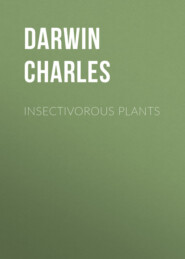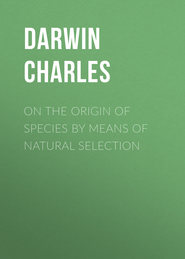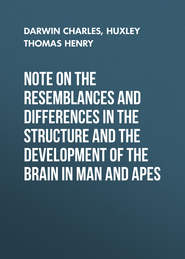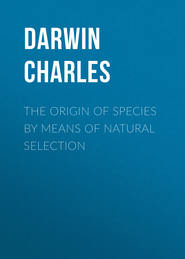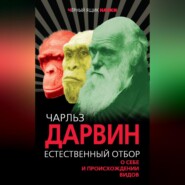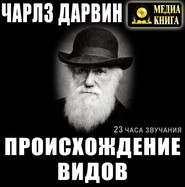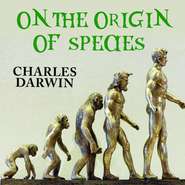По всем вопросам обращайтесь на: info@litportal.ru
(©) 2003-2025.
✖
Life and Letters of Charles Darwin — Volume 1
Настройки чтения
Размер шрифта
Высота строк
Поля
Yours affectionately, C. DARWIN.
CHARLES DARWIN TO T.H. HUXLEY. Ilkley, Otley, Yorkshire, October 15th [1859].
My dear Huxley,
I am here hydropathising and coming to life again, after having finished my accursed book, which would have been easy work to any one else, but half-killed me. I have thought you would give me one bit of information, and I know not to whom else to apply; viz., the addresses of Barrande, Von Siebold, Keyserling (I dare say Sir Roderick would know the latter).
Can you tell me of any good and SPECULATIVE foreigners to whom it would be worth while to send copies of my book, on the 'Origin of Species'? I doubt whether it is worth sending to Siebold. I should like to send a few copies about, but how many I can afford I know not yet till I hear what price Murray affixes.
I need not say that I will send, of course, one to you, in the first week of November. I hope to send copies abroad immediately. I shall be INTENSELY curious to hear what effect the book produces on you. I know that there will be much in it which you will object to, and I do not doubt many errors. I am very far from expecting to convert you to many of my heresies; but if, on the whole, you and two or three others think I am on the right road, I shall not care what the mob of naturalists think. The penultimate chapter (Chapter XIII. is on Classification, Morphology, Embryology, and Rudimentary Organs.), though I believe it includes the truth, will, I much fear, make you savage. Do not act and say, like Macleay versus Fleming, "I write with aqua fortis to bite into brass."
Ever yours, C. DARWIN.
CHARLES DARWIN TO C. LYELL. Ilkley, Yorkshire, October 20th [1859].
My dear Lyell,
I have been reading over all your letters consecutively, and I do not feel that I have thanked you half enough for the extreme pleasure which they have given me, and for their utility. I see in them evidence of fluctuation in the degree of credence you give to the theory; nor am I at all surprised at this, for many and many fluctuations I have undergone.
There is one point in your letter which I did not notice, about the animals (and many plants) naturalised in Australia, which you think could not endure without man's aid. I cannot see how man does aid the feral cattle. But, letting that pass, you seem to think, that because they suffer prodigious destruction during droughts, that they would all be destroyed. In the "gran secos" of La Plata, the indigenous animals, such as the American deer, die by thousands, and suffer apparently as much as the cattle. In parts of India, after a drought, it takes ten or more years before the indigenous mammals get up to their full number again. Your argument would, I think, apply to the aborigines as well as to the feral.
An animal or plant which becomes feral in one small territory might be destroyed by climate, but I can hardly believe so, when once feral over several large territories. Again, I feel inclined to swear at climate: do not think me impudent for attacking you about climate. You say you doubt whether man could have existed under the Eocene climate, but man can now withstand the climate of Esquimaux-land and West Equatorial Africa; and surely you do not think the Eocene climate differed from the present throughout all Europe, as much as the Arctic regions differ from Equatorial Africa?
With respect to organisms being created on the American type in America, it might, I think, be said that they were so created to prevent them being too well created, so as to beat the aborigines; but this seems to me, somehow, a monstrous doctrine.
I have reflected a good deal on what you say on the necessity of continued intervention of creative power. I cannot see this necessity; and its admission, I think, would make the theory of Natural Selection valueless. Grant a simple Archetypal creature, like the Mud-fish or Lepidosiren, with the five senses and some vestige of mind, and I believe natural selection will account for the production of every vertebrate animal.
Farewell; forgive me for indulging in this prose, and believe me, with cordial thanks,
Your ever attached disciple, C. DARWIN.
P.S. — When, and if, you reread, I supplicate you to write on the margin the word "expand," when too condensed, or "not clear." or "?." Such marks would cost you little trouble, and I could copy them and reflect on them, and their value would be infinite to me.
My larger book will have to be wholly re-written, and not merely the present volume expanded; so that I want to waste as little time over this volume as possible, if another edition be called for; but I fear the subject will be too perplexing, as I have treated it, for general public.
CHARLES DARWIN TO J.D. HOOKER. Ilkley, Yorkshire, Sunday [October 23rd, 1859].
My dear Hooker,
I congratulate you on your 'Introduction' ("Australian Flora".) being in fact finished. I am sure from what I read of it (and deeply I shall be interested in reading it straight through), that it must have cost you a prodigious amount of labour and thought. I shall like very much to see the sheet, which you wish me to look at. Now I am so completely a gentleman, that I have sometimes a little difficulty to pass the day; but it is astonishing how idle a three weeks I have passed. If it is any comfort to you, pray delude yourself by saying that you intend "sticking to humdrum science." But I believe it just as much as if a plant were to say that, "I have been growing all my life, and, by Jove, I will stop growing." You cannot help yourself; you are not clever enough for that. You could not even remain idle, as I have done, for three weeks! What you say about Lyell pleases me exceedingly; I had not at all inferred from his letters that he had come so much round. I remember thinking, above a year ago, that if ever I lived to see Lyell, yourself, and Huxley come round, partly by my book, and partly by their own reflections, I should feel that the subject is safe, and all the world might rail, but that ultimately the theory of Natural Selection (though, no doubt, imperfect in its present condition, and embracing many errors) would prevail. Nothing will ever convince me that three such men, with so much diversified knowledge, and so well accustomed to search for truth, could err greatly. I have spoken of you here as a convert made by me; but I know well how much larger the share has been of your own self-thought. I am intensely curious to hear Huxley's opinion of my book. I fear my long discussion on Classification will disgust him; for it is much opposed to what he once said to me.
But, how I am running on. You see how idle I am; but I have so enjoyed your letter that you must forgive me. With respect to migration during the glacial period: I think Lyell quite comprehends, for he has given me a supporting fact. But, perhaps, he unconsciously hates (do not say so to him) the view as slightly staggering him on his favourite theory of all changes of climate being due to changes in the relative position of land and water.
I will send copies of my book to all the men specified by you;... you would be so kind as to add title, as Doctor, or Professor, or Monsieur, or Von, and initials (when wanted), and addresses to the names on the enclosed list, and let me have it pretty SOON, as towards the close of this week Murray says the copies to go abroad will be ready. I am anxious to get my view generally known, and not, I hope and think, for mere personal conceit...
CHARLES DARWIN TO C. LYELL. Ilkley, Yorkshire, October 25th [1859].
...Our difference on "principle of improvement" and "power of adaptation" is too profound for discussion by letter. If I am wrong, I am quite blind to my error. If I am right, our difference will be got over only by your re-reading carefully and reflecting on my first four chapters. I supplicate you to read these again carefully. The so-called improvement of our Shorthorn cattle, pigeons, etc., does not presuppose or require any aboriginal "power of adaptation," or "principle of improvement;" it requires only diversified variability, and man to select or take advantage of those modifications which are useful to him; so under nature any slight modification which CHANCES to arise, and is useful to any creature, is selected or preserved in the struggle for life; any modification which is injurious is destroyed or rejected; any which is neither useful nor injurious will be left a fluctuating element. When you contrast natural selection and "improvement," you seem always to overlook (for I do not see how you can deny) that every step in the natural selection of each species implies improvement in that species in relation to its conditions of life. No modification can be selected without it be an improvement or advantage. Improvement implies, I suppose, each form obtaining many parts or organs, all excellently adapted for their functions. As each species is improved, and as the number of forms will have increased, if we look to the whole course of time, the organic condition of life for other forms will become more complex, and there will be a necessity for other forms to become improved, or they will be exterminated; and I can see no limit to this process of improvement, without the intervention of any other and direct principle of improvement. All this seems to me quite compatible with certain forms fitted for simple conditions, remaining unaltered, or being degraded.
If I have a second edition, I will reiterate "Natural Selection," and, as a general consequence, "Natural Improvement."
As you go, as far as you do, I begin strongly to think, judging from myself, that you will go much further. How slowly the older geologists admitted your grand views on existing geological causes of change!
If at any time you think I can answer any question, it is a real pleasure to me to write.
Yours affectionately, C. DARWIN.
CHARLES DARWIN TO J. MURRAY. Ilkley, Yorkshire [1859].
My dear Sir,
I have received your kind note and the copy; I am infinitely pleased and proud at the appearance of my child.
I quite agree to all you propose about price. But you are really too generous about the, to me, scandalously heavy corrections. Are you not acting unfairly towards yourself? Would it not be better at least to share the 72 pounds 8 shillings? I shall be fully satisfied, for I had no business to send, though quite unintentionally and unexpectedly, such badly composed MS. to the printers.
Thank you for your kind offer to distribute the copies to my friends and assistors as soon as possible. Do not trouble yourself much about the foreigners, as Messrs. Williams and Norgate have most kindly offered to do their best, and they are accustomed to send to all parts of the world.
I will pay for my copies whenever you like. I am so glad that you were so good as to undertake the publication of my book.
My dear Sir, yours very sincerely, CHARLES DARWIN.
P.S. — Please do not forget to let me hear about two days before the copies are distributed.
I do not know when I shall leave this place, certainly not for several weeks. Whenever I am in London I will call on you.
CHAPTER 1.XIV. — BY PROFESSOR HUXLEY
ON THE RECEPTION OF THE 'ORIGIN OF SPECIES.'
To the present generation, that is to say, the people a few years on the hither and thither side of thirty, the name of Charles Darwin stands alongside of those of Isaac Newton and Michael Faraday; and, like them, calls up the grand ideal of a searcher after truth and interpreter of Nature. They think of him who bore it as a rare combination of genius, industry, and unswerving veracity, who earned his place among the most famous men of the age by sheer native power, in the teeth of a gale of popular prejudice, and uncheered by a sign of favour or appreciation from the official fountains of honour; as one who in spite of an acute sensitiveness to praise and blame, and notwithstanding provocations which might have excused any outbreak, kept himself clear of all envy, hatred, and malice, nor dealt otherwise than fairly and justly with the unfairness and injustice which was showered upon him; while, to the end of his days, he was ready to listen with patience and respect to the most insignificant of reasonable objectors.
And with respect to that theory of the origin of the forms of life peopling our globe, with which Darwin's name is bound up as closely as that of Newton with the theory of gravitation, nothing seems to be further from the mind of the present generation than any attempt to smother it with ridicule or to crush it by vehemence of denunciation. "The struggle for existence," and "Natural selection," have become household words and every-day conceptions. The reality and the importance of the natural processes on which Darwin founds his deductions are no more doubted than those of growth and multiplication; and, whether the full potency attributed to them is admitted or not, no one doubts their vast and far-reaching significance. Wherever the biological sciences are studied, the 'Origin of Species' lights the paths of the investigator; wherever they are taught it permeates the course of instruction. Nor has the influence of Darwinian ideas been less profound, beyond the realms of Biology. The oldest of all philosophies, that of Evolution, was bound hand and foot and cast into utter darkness during the millennium of theological scholasticism. But Darwin poured new life-blood into the ancient frame; the bonds burst, and the revivified thought of ancient Greece has proved itself to be a more adequate expression of the universal order of things than any of the schemes which have been accepted by the credulity and welcomed by the superstition of seventy later generations of men.
To any one who studies the signs of the times, the emergence of the philosophy of Evolution, in the attitude of claimant to the throne of the world of thought, from the limbo of hated and, as many hoped, forgotten things, is the most portentous event of the nineteenth century. But the most effective weapons of the modern champions of Evolution were fabricated by Darwin; and the 'Origin of Species' has enlisted a formidable body of combatants, trained in the severe school of Physical Science, whose ears might have long remained deaf to the speculations of a priori philosophers.
I do not think any candid or instructed person will deny the truth of that which has just been asserted. He may hate the very name of Evolution, and may deny its pretensions as vehemently as a Jacobite denied those of George the Second. But there it is — not only as solidly seated as the Hanoverian dynasty, but happily independent of Parliamentary sanction — and the dullest antagonists have come to see that they have to deal with an adversary whose bones are to be broken by no amount of bad words.
Even the theologians have almost ceased to pit the plain meaning of Genesis against the no less plain meaning of Nature. Their more candid, or more cautious, representatives have given up dealing with Evolution as if it were a damnable heresy, and have taken refuge in one of two courses. Either they deny that Genesis was meant to teach scientific truth, and thus save the veracity of the record at the expense of its authority; or they expend their energies in devising the cruel ingenuities of the reconciler, and torture texts in the vain hope of making them confess the creed of Science. But when the peine forte et dure is over, the antique sincerity of the venerable sufferer always reasserts itself. Genesis is honest to the core, and professes to be no more than it is, a repository of venerable traditions of unknown origin, claiming no scientific authority and possessing none.
As my pen finishes these passages, I can but be amused to think what a terrible hubbub would have been made (in truth was made) about any similar expressions of opinion a quarter of a century ago. In fact, the contrast between the present condition of public opinion upon the Darwinian question; between the estimation in which Darwin's views are now held in the scientific world; between the acquiescence, or at least quiescence, of the theologians of the self-respecting order at the present day and the outburst of antagonism on all sides in 1858-9, when the new theory respecting the origin of species first became known to the older generation to which I belong, is so startling that, except for documentary evidence, I should be sometimes inclined to think my memories dreams. I have a great respect for the younger generation myself (they can write our lives, and ravel out all our follies, if they choose to take the trouble, by and by), and I should be glad to be assured that the feeling is reciprocal; but I am afraid that the story of our dealings with Darwin may prove a great hindrance to that veneration for our wisdom which I should like them to display. We have not even the excuse that, thirty years ago, Mr. Darwin was an obscure novice, who had no claims on our attention. On the contrary, his remarkable zoological and geological investigations had long given him an assured position among the most eminent and original investigators of the day; while his charming 'Voyage of a Naturalist' had justly earned him a wide-spread reputation among the general public. I doubt if there was any man then living who had a better right to expect that anything he might choose to say on such a question as the Origin of Species would be listened to with profound attention, and discussed with respect; and there was certainly no man whose personal character should have afforded a better safeguard against attacks, instinct with malignity and spiced with shameless impertinences.
Yet such was the portion of one of the kindest and truest men that it was ever my good fortune to know; and years had to pass away before misrepresentation, ridicule, and denunciation, ceased to be the most notable constituents of the majority of the multitudinous criticisms of his work which poured from the press. I am loth to rake any of these ancient scandals from their well-deserved oblivion; but I must make good a statement which may seem overcharged to the present generation, and there is no piece justificative more apt for the purpose, or more worthy of such dishonour, than the article in the 'Quarterly Review' for July, 1860. (I was not aware when I wrote these passages that the authorship of the article had been publicly acknowledged. Confession unaccompanied by penitence, however, affords no ground for mitigation of judgment; and the kindliness with which Mr. Darwin speaks of his assailant, Bishop Wilberforce (vol. ii.), is so striking an exemplification of his singular gentleness and modesty, that it rather increases one's indignation against the presumption of his critic.) Since Lord Brougham assailed Dr. Young, the world has seen no such specimen of the insolence of a shallow pretender to a Master in Science as this remarkable production, in which one of the most exact of observers, most cautious of reasoners, and most candid of expositors, of this or any other age, is held up to scorn as a "flighty" person, who endeavours "to prop up his utterly rotten fabric of guess and speculation," and whose "mode of dealing with nature" is reprobated as "utterly dishonourable to Natural Science." And all this high and mighty talk, which would have been indecent in one of Mr. Darwin's equals, proceeds from a writer whose want of intelligence, or of conscience, or of both, is so great, that, by way of an objection to Mr. Darwin's views, he can ask, "Is it credible that all favourable varieties of turnips are tending to become men;" who is so ignorant of paleontology, that he can talk of the "flowers and fruits" of the plants of the carboniferous epoch; of comparative anatomy, that he can gravely affirm the poison apparatus of the venomous snakes to be "entirely separate from the ordinary laws of animal life, and peculiar to themselves;" of the rudiments of physiology, that he can ask, "what advantage of life could alter the shape of the corpuscles into which the blood can be evaporated?" Nor does the reviewer fail to flavour this outpouring of preposterous incapacity with a little stimulation of the odium theologicum. Some inkling of the history of the conflicts between Astronomy, Geology, and Theology, leads him to keep a retreat open by the proviso that he cannot "consent to test the truth of Natural Science by the word of Revelation;" but, for all that, he devotes pages to the exposition of his conviction that Mr. Darwin's theory "contradicts the revealed relation of the creation to its Creator," and is "inconsistent with the fulness of his glory."
If I confine my retrospect of the reception of the 'Origin of Species' to a twelvemonth, or thereabouts, from the time of its publication, I do not recollect anything quite so foolish and unmannerly as the 'Quarterly Review' article, unless, perhaps, the address of a Reverend Professor to the Dublin Geological Society might enter into competition with it. But a large proportion of Mr. Darwin's critics had a lamentable resemblance to the 'Quarterly' reviewer, in so far as they lacked either the will, or the wit, to make themselves masters of his doctrine; hardly any possessed the knowledge required to follow him through the immense range of biological and geological science which the 'Origin' covered; while, too commonly, they had prejudiced the case on theological grounds, and, as seems to be inevitable when this happens, eked out lack of reason by superfluity of railing.
But it will be more pleasant and more profitable to consider those criticisms, which were acknowledged by writers of scientific authority, or which bore internal evidence of the greater or less competency and, often, of the good faith, of their authors. Restricting my survey to a twelvemonth, or thereabouts, after the publication of the 'Origin,' I find among such critics Louis Agassiz ("The arguments presented by Darwin in favor of a universal derivation from one primary form of all the peculiarities existing now among living beings have not made the slightest impression on my mind.")
"Until the facts of Nature are shown to have been mistaken by those who have collected them, and that they have a different meaning from that now generally assigned to them, I shall therefore consider the transmutation theory as a scientific mistake, untrue in its facts, unscientific in its method, and mischievous in its tendency." — Silliman's 'Journal,' July, 1860, pages 143, 154. Extract from the 3rd volume of 'Contributions to the Natural History of the United States.'); Murray, an excellent entomologist; Harvey, a botanist of considerable repute; and the author of an article in the 'Edinburgh Review,' all strongly adverse to Darwin. Pictet, the distinguished and widely learned paleontogist of Geneva, treats Mr. Darwin with a respect which forms a grateful contrast to the tone of some of the preceding writers, but consents to go with him only a very little way. ("I see no serious objections to the formation of varieties by natural selection in the existing world, and that, so far as earlier epochs are concerned, this law may be assumed to explain the origin of closely allied species, supposing for this purpose a very long period of time."
CHARLES DARWIN TO T.H. HUXLEY. Ilkley, Otley, Yorkshire, October 15th [1859].
My dear Huxley,
I am here hydropathising and coming to life again, after having finished my accursed book, which would have been easy work to any one else, but half-killed me. I have thought you would give me one bit of information, and I know not to whom else to apply; viz., the addresses of Barrande, Von Siebold, Keyserling (I dare say Sir Roderick would know the latter).
Can you tell me of any good and SPECULATIVE foreigners to whom it would be worth while to send copies of my book, on the 'Origin of Species'? I doubt whether it is worth sending to Siebold. I should like to send a few copies about, but how many I can afford I know not yet till I hear what price Murray affixes.
I need not say that I will send, of course, one to you, in the first week of November. I hope to send copies abroad immediately. I shall be INTENSELY curious to hear what effect the book produces on you. I know that there will be much in it which you will object to, and I do not doubt many errors. I am very far from expecting to convert you to many of my heresies; but if, on the whole, you and two or three others think I am on the right road, I shall not care what the mob of naturalists think. The penultimate chapter (Chapter XIII. is on Classification, Morphology, Embryology, and Rudimentary Organs.), though I believe it includes the truth, will, I much fear, make you savage. Do not act and say, like Macleay versus Fleming, "I write with aqua fortis to bite into brass."
Ever yours, C. DARWIN.
CHARLES DARWIN TO C. LYELL. Ilkley, Yorkshire, October 20th [1859].
My dear Lyell,
I have been reading over all your letters consecutively, and I do not feel that I have thanked you half enough for the extreme pleasure which they have given me, and for their utility. I see in them evidence of fluctuation in the degree of credence you give to the theory; nor am I at all surprised at this, for many and many fluctuations I have undergone.
There is one point in your letter which I did not notice, about the animals (and many plants) naturalised in Australia, which you think could not endure without man's aid. I cannot see how man does aid the feral cattle. But, letting that pass, you seem to think, that because they suffer prodigious destruction during droughts, that they would all be destroyed. In the "gran secos" of La Plata, the indigenous animals, such as the American deer, die by thousands, and suffer apparently as much as the cattle. In parts of India, after a drought, it takes ten or more years before the indigenous mammals get up to their full number again. Your argument would, I think, apply to the aborigines as well as to the feral.
An animal or plant which becomes feral in one small territory might be destroyed by climate, but I can hardly believe so, when once feral over several large territories. Again, I feel inclined to swear at climate: do not think me impudent for attacking you about climate. You say you doubt whether man could have existed under the Eocene climate, but man can now withstand the climate of Esquimaux-land and West Equatorial Africa; and surely you do not think the Eocene climate differed from the present throughout all Europe, as much as the Arctic regions differ from Equatorial Africa?
With respect to organisms being created on the American type in America, it might, I think, be said that they were so created to prevent them being too well created, so as to beat the aborigines; but this seems to me, somehow, a monstrous doctrine.
I have reflected a good deal on what you say on the necessity of continued intervention of creative power. I cannot see this necessity; and its admission, I think, would make the theory of Natural Selection valueless. Grant a simple Archetypal creature, like the Mud-fish or Lepidosiren, with the five senses and some vestige of mind, and I believe natural selection will account for the production of every vertebrate animal.
Farewell; forgive me for indulging in this prose, and believe me, with cordial thanks,
Your ever attached disciple, C. DARWIN.
P.S. — When, and if, you reread, I supplicate you to write on the margin the word "expand," when too condensed, or "not clear." or "?." Such marks would cost you little trouble, and I could copy them and reflect on them, and their value would be infinite to me.
My larger book will have to be wholly re-written, and not merely the present volume expanded; so that I want to waste as little time over this volume as possible, if another edition be called for; but I fear the subject will be too perplexing, as I have treated it, for general public.
CHARLES DARWIN TO J.D. HOOKER. Ilkley, Yorkshire, Sunday [October 23rd, 1859].
My dear Hooker,
I congratulate you on your 'Introduction' ("Australian Flora".) being in fact finished. I am sure from what I read of it (and deeply I shall be interested in reading it straight through), that it must have cost you a prodigious amount of labour and thought. I shall like very much to see the sheet, which you wish me to look at. Now I am so completely a gentleman, that I have sometimes a little difficulty to pass the day; but it is astonishing how idle a three weeks I have passed. If it is any comfort to you, pray delude yourself by saying that you intend "sticking to humdrum science." But I believe it just as much as if a plant were to say that, "I have been growing all my life, and, by Jove, I will stop growing." You cannot help yourself; you are not clever enough for that. You could not even remain idle, as I have done, for three weeks! What you say about Lyell pleases me exceedingly; I had not at all inferred from his letters that he had come so much round. I remember thinking, above a year ago, that if ever I lived to see Lyell, yourself, and Huxley come round, partly by my book, and partly by their own reflections, I should feel that the subject is safe, and all the world might rail, but that ultimately the theory of Natural Selection (though, no doubt, imperfect in its present condition, and embracing many errors) would prevail. Nothing will ever convince me that three such men, with so much diversified knowledge, and so well accustomed to search for truth, could err greatly. I have spoken of you here as a convert made by me; but I know well how much larger the share has been of your own self-thought. I am intensely curious to hear Huxley's opinion of my book. I fear my long discussion on Classification will disgust him; for it is much opposed to what he once said to me.
But, how I am running on. You see how idle I am; but I have so enjoyed your letter that you must forgive me. With respect to migration during the glacial period: I think Lyell quite comprehends, for he has given me a supporting fact. But, perhaps, he unconsciously hates (do not say so to him) the view as slightly staggering him on his favourite theory of all changes of climate being due to changes in the relative position of land and water.
I will send copies of my book to all the men specified by you;... you would be so kind as to add title, as Doctor, or Professor, or Monsieur, or Von, and initials (when wanted), and addresses to the names on the enclosed list, and let me have it pretty SOON, as towards the close of this week Murray says the copies to go abroad will be ready. I am anxious to get my view generally known, and not, I hope and think, for mere personal conceit...
CHARLES DARWIN TO C. LYELL. Ilkley, Yorkshire, October 25th [1859].
...Our difference on "principle of improvement" and "power of adaptation" is too profound for discussion by letter. If I am wrong, I am quite blind to my error. If I am right, our difference will be got over only by your re-reading carefully and reflecting on my first four chapters. I supplicate you to read these again carefully. The so-called improvement of our Shorthorn cattle, pigeons, etc., does not presuppose or require any aboriginal "power of adaptation," or "principle of improvement;" it requires only diversified variability, and man to select or take advantage of those modifications which are useful to him; so under nature any slight modification which CHANCES to arise, and is useful to any creature, is selected or preserved in the struggle for life; any modification which is injurious is destroyed or rejected; any which is neither useful nor injurious will be left a fluctuating element. When you contrast natural selection and "improvement," you seem always to overlook (for I do not see how you can deny) that every step in the natural selection of each species implies improvement in that species in relation to its conditions of life. No modification can be selected without it be an improvement or advantage. Improvement implies, I suppose, each form obtaining many parts or organs, all excellently adapted for their functions. As each species is improved, and as the number of forms will have increased, if we look to the whole course of time, the organic condition of life for other forms will become more complex, and there will be a necessity for other forms to become improved, or they will be exterminated; and I can see no limit to this process of improvement, without the intervention of any other and direct principle of improvement. All this seems to me quite compatible with certain forms fitted for simple conditions, remaining unaltered, or being degraded.
If I have a second edition, I will reiterate "Natural Selection," and, as a general consequence, "Natural Improvement."
As you go, as far as you do, I begin strongly to think, judging from myself, that you will go much further. How slowly the older geologists admitted your grand views on existing geological causes of change!
If at any time you think I can answer any question, it is a real pleasure to me to write.
Yours affectionately, C. DARWIN.
CHARLES DARWIN TO J. MURRAY. Ilkley, Yorkshire [1859].
My dear Sir,
I have received your kind note and the copy; I am infinitely pleased and proud at the appearance of my child.
I quite agree to all you propose about price. But you are really too generous about the, to me, scandalously heavy corrections. Are you not acting unfairly towards yourself? Would it not be better at least to share the 72 pounds 8 shillings? I shall be fully satisfied, for I had no business to send, though quite unintentionally and unexpectedly, such badly composed MS. to the printers.
Thank you for your kind offer to distribute the copies to my friends and assistors as soon as possible. Do not trouble yourself much about the foreigners, as Messrs. Williams and Norgate have most kindly offered to do their best, and they are accustomed to send to all parts of the world.
I will pay for my copies whenever you like. I am so glad that you were so good as to undertake the publication of my book.
My dear Sir, yours very sincerely, CHARLES DARWIN.
P.S. — Please do not forget to let me hear about two days before the copies are distributed.
I do not know when I shall leave this place, certainly not for several weeks. Whenever I am in London I will call on you.
CHAPTER 1.XIV. — BY PROFESSOR HUXLEY
ON THE RECEPTION OF THE 'ORIGIN OF SPECIES.'
To the present generation, that is to say, the people a few years on the hither and thither side of thirty, the name of Charles Darwin stands alongside of those of Isaac Newton and Michael Faraday; and, like them, calls up the grand ideal of a searcher after truth and interpreter of Nature. They think of him who bore it as a rare combination of genius, industry, and unswerving veracity, who earned his place among the most famous men of the age by sheer native power, in the teeth of a gale of popular prejudice, and uncheered by a sign of favour or appreciation from the official fountains of honour; as one who in spite of an acute sensitiveness to praise and blame, and notwithstanding provocations which might have excused any outbreak, kept himself clear of all envy, hatred, and malice, nor dealt otherwise than fairly and justly with the unfairness and injustice which was showered upon him; while, to the end of his days, he was ready to listen with patience and respect to the most insignificant of reasonable objectors.
And with respect to that theory of the origin of the forms of life peopling our globe, with which Darwin's name is bound up as closely as that of Newton with the theory of gravitation, nothing seems to be further from the mind of the present generation than any attempt to smother it with ridicule or to crush it by vehemence of denunciation. "The struggle for existence," and "Natural selection," have become household words and every-day conceptions. The reality and the importance of the natural processes on which Darwin founds his deductions are no more doubted than those of growth and multiplication; and, whether the full potency attributed to them is admitted or not, no one doubts their vast and far-reaching significance. Wherever the biological sciences are studied, the 'Origin of Species' lights the paths of the investigator; wherever they are taught it permeates the course of instruction. Nor has the influence of Darwinian ideas been less profound, beyond the realms of Biology. The oldest of all philosophies, that of Evolution, was bound hand and foot and cast into utter darkness during the millennium of theological scholasticism. But Darwin poured new life-blood into the ancient frame; the bonds burst, and the revivified thought of ancient Greece has proved itself to be a more adequate expression of the universal order of things than any of the schemes which have been accepted by the credulity and welcomed by the superstition of seventy later generations of men.
To any one who studies the signs of the times, the emergence of the philosophy of Evolution, in the attitude of claimant to the throne of the world of thought, from the limbo of hated and, as many hoped, forgotten things, is the most portentous event of the nineteenth century. But the most effective weapons of the modern champions of Evolution were fabricated by Darwin; and the 'Origin of Species' has enlisted a formidable body of combatants, trained in the severe school of Physical Science, whose ears might have long remained deaf to the speculations of a priori philosophers.
I do not think any candid or instructed person will deny the truth of that which has just been asserted. He may hate the very name of Evolution, and may deny its pretensions as vehemently as a Jacobite denied those of George the Second. But there it is — not only as solidly seated as the Hanoverian dynasty, but happily independent of Parliamentary sanction — and the dullest antagonists have come to see that they have to deal with an adversary whose bones are to be broken by no amount of bad words.
Even the theologians have almost ceased to pit the plain meaning of Genesis against the no less plain meaning of Nature. Their more candid, or more cautious, representatives have given up dealing with Evolution as if it were a damnable heresy, and have taken refuge in one of two courses. Either they deny that Genesis was meant to teach scientific truth, and thus save the veracity of the record at the expense of its authority; or they expend their energies in devising the cruel ingenuities of the reconciler, and torture texts in the vain hope of making them confess the creed of Science. But when the peine forte et dure is over, the antique sincerity of the venerable sufferer always reasserts itself. Genesis is honest to the core, and professes to be no more than it is, a repository of venerable traditions of unknown origin, claiming no scientific authority and possessing none.
As my pen finishes these passages, I can but be amused to think what a terrible hubbub would have been made (in truth was made) about any similar expressions of opinion a quarter of a century ago. In fact, the contrast between the present condition of public opinion upon the Darwinian question; between the estimation in which Darwin's views are now held in the scientific world; between the acquiescence, or at least quiescence, of the theologians of the self-respecting order at the present day and the outburst of antagonism on all sides in 1858-9, when the new theory respecting the origin of species first became known to the older generation to which I belong, is so startling that, except for documentary evidence, I should be sometimes inclined to think my memories dreams. I have a great respect for the younger generation myself (they can write our lives, and ravel out all our follies, if they choose to take the trouble, by and by), and I should be glad to be assured that the feeling is reciprocal; but I am afraid that the story of our dealings with Darwin may prove a great hindrance to that veneration for our wisdom which I should like them to display. We have not even the excuse that, thirty years ago, Mr. Darwin was an obscure novice, who had no claims on our attention. On the contrary, his remarkable zoological and geological investigations had long given him an assured position among the most eminent and original investigators of the day; while his charming 'Voyage of a Naturalist' had justly earned him a wide-spread reputation among the general public. I doubt if there was any man then living who had a better right to expect that anything he might choose to say on such a question as the Origin of Species would be listened to with profound attention, and discussed with respect; and there was certainly no man whose personal character should have afforded a better safeguard against attacks, instinct with malignity and spiced with shameless impertinences.
Yet such was the portion of one of the kindest and truest men that it was ever my good fortune to know; and years had to pass away before misrepresentation, ridicule, and denunciation, ceased to be the most notable constituents of the majority of the multitudinous criticisms of his work which poured from the press. I am loth to rake any of these ancient scandals from their well-deserved oblivion; but I must make good a statement which may seem overcharged to the present generation, and there is no piece justificative more apt for the purpose, or more worthy of such dishonour, than the article in the 'Quarterly Review' for July, 1860. (I was not aware when I wrote these passages that the authorship of the article had been publicly acknowledged. Confession unaccompanied by penitence, however, affords no ground for mitigation of judgment; and the kindliness with which Mr. Darwin speaks of his assailant, Bishop Wilberforce (vol. ii.), is so striking an exemplification of his singular gentleness and modesty, that it rather increases one's indignation against the presumption of his critic.) Since Lord Brougham assailed Dr. Young, the world has seen no such specimen of the insolence of a shallow pretender to a Master in Science as this remarkable production, in which one of the most exact of observers, most cautious of reasoners, and most candid of expositors, of this or any other age, is held up to scorn as a "flighty" person, who endeavours "to prop up his utterly rotten fabric of guess and speculation," and whose "mode of dealing with nature" is reprobated as "utterly dishonourable to Natural Science." And all this high and mighty talk, which would have been indecent in one of Mr. Darwin's equals, proceeds from a writer whose want of intelligence, or of conscience, or of both, is so great, that, by way of an objection to Mr. Darwin's views, he can ask, "Is it credible that all favourable varieties of turnips are tending to become men;" who is so ignorant of paleontology, that he can talk of the "flowers and fruits" of the plants of the carboniferous epoch; of comparative anatomy, that he can gravely affirm the poison apparatus of the venomous snakes to be "entirely separate from the ordinary laws of animal life, and peculiar to themselves;" of the rudiments of physiology, that he can ask, "what advantage of life could alter the shape of the corpuscles into which the blood can be evaporated?" Nor does the reviewer fail to flavour this outpouring of preposterous incapacity with a little stimulation of the odium theologicum. Some inkling of the history of the conflicts between Astronomy, Geology, and Theology, leads him to keep a retreat open by the proviso that he cannot "consent to test the truth of Natural Science by the word of Revelation;" but, for all that, he devotes pages to the exposition of his conviction that Mr. Darwin's theory "contradicts the revealed relation of the creation to its Creator," and is "inconsistent with the fulness of his glory."
If I confine my retrospect of the reception of the 'Origin of Species' to a twelvemonth, or thereabouts, from the time of its publication, I do not recollect anything quite so foolish and unmannerly as the 'Quarterly Review' article, unless, perhaps, the address of a Reverend Professor to the Dublin Geological Society might enter into competition with it. But a large proportion of Mr. Darwin's critics had a lamentable resemblance to the 'Quarterly' reviewer, in so far as they lacked either the will, or the wit, to make themselves masters of his doctrine; hardly any possessed the knowledge required to follow him through the immense range of biological and geological science which the 'Origin' covered; while, too commonly, they had prejudiced the case on theological grounds, and, as seems to be inevitable when this happens, eked out lack of reason by superfluity of railing.
But it will be more pleasant and more profitable to consider those criticisms, which were acknowledged by writers of scientific authority, or which bore internal evidence of the greater or less competency and, often, of the good faith, of their authors. Restricting my survey to a twelvemonth, or thereabouts, after the publication of the 'Origin,' I find among such critics Louis Agassiz ("The arguments presented by Darwin in favor of a universal derivation from one primary form of all the peculiarities existing now among living beings have not made the slightest impression on my mind.")
"Until the facts of Nature are shown to have been mistaken by those who have collected them, and that they have a different meaning from that now generally assigned to them, I shall therefore consider the transmutation theory as a scientific mistake, untrue in its facts, unscientific in its method, and mischievous in its tendency." — Silliman's 'Journal,' July, 1860, pages 143, 154. Extract from the 3rd volume of 'Contributions to the Natural History of the United States.'); Murray, an excellent entomologist; Harvey, a botanist of considerable repute; and the author of an article in the 'Edinburgh Review,' all strongly adverse to Darwin. Pictet, the distinguished and widely learned paleontogist of Geneva, treats Mr. Darwin with a respect which forms a grateful contrast to the tone of some of the preceding writers, but consents to go with him only a very little way. ("I see no serious objections to the formation of varieties by natural selection in the existing world, and that, so far as earlier epochs are concerned, this law may be assumed to explain the origin of closely allied species, supposing for this purpose a very long period of time."







